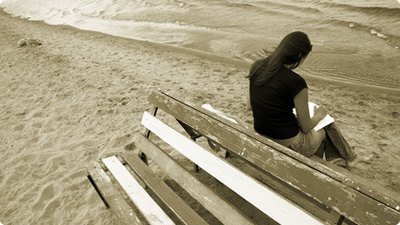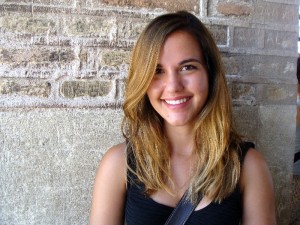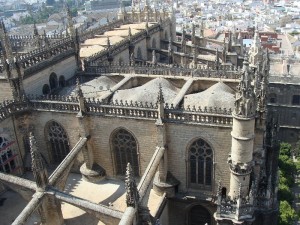
Queen’s University student Ana Rodriguez Machado has won first prize in the 2012 Aspiring Canadian Poets Contest for her entry “An Afternoon in Central America,” and I’m pleased to share my interview with the young writer below. Poet Catherine Graham, who judged the contest, describes Ana’s submission this way:
“Concise, charged with menace, and with an arresting range — from the highly poetic, The mountain danced with shades of cadmium and emerald, to the stinging last line — this five-line poem hooked me.”
You can read Ana’s poem, along with those of second-prize winner Nora Grove and third-prize winner Jill Talbot, on the contest website here. Congratulations to the three winners, each of whom has been awarded online mentoring sessions with Catherine.
This inaugural national poetry contest for previously unpublished writers was established by Heidi Stock, president of Prospect Research Experts Inc., a grant research and writing firm that helps charities find private sector funding, and creator of Gift To A Star, an initiative that recognizes and rewards staff and volunteers at Canadian charities. Heidi is a poet herself. Vancouver’s Poet Laureate Evelyn Lau is honorary patron of the Aspiring Canadian Poets Contest.
See details of next year’s competition at the end of this post.
§ § §
 Born in Havana, Cuba, ANA RODRIGUEZ MACHADO moved with her family to Canada when she was 9 years old. She is an undergraduate at Queen’s University in Kingston, Ontario, studying Language and Linguistics with a minor in Philosophy, and is currently taking courses in the Faculty of Philology at the University of Seville, Spain. She is working toward a master’s in Translation and Interpretation with specialization in Spanish and English. Along with writing, Ana enjoys singing and eating delicious things. She lives for new places, live music, and the smell of the ocean.
Born in Havana, Cuba, ANA RODRIGUEZ MACHADO moved with her family to Canada when she was 9 years old. She is an undergraduate at Queen’s University in Kingston, Ontario, studying Language and Linguistics with a minor in Philosophy, and is currently taking courses in the Faculty of Philology at the University of Seville, Spain. She is working toward a master’s in Translation and Interpretation with specialization in Spanish and English. Along with writing, Ana enjoys singing and eating delicious things. She lives for new places, live music, and the smell of the ocean.
“I’ve always loved poetry and have been fascinated by the influence words can have on us, whether it is to make us feel something new or to entirely change our perspective.”
What was your first thought when you heard you’d won top prize in the Aspiring Canadian Poets Contest?
I was completely surprised! I had submitted my poem a few months prior and had almost forgotten about my entry. When I received an e-mail congratulating me on winning, my first thought was total disbelief; I had to read it twice for the news to sink in. I felt so fortunate that someone had understood and appreciated my work.
And your second?
My second thought was to immediately share the news with my parents. They have always given me undying support and encouragement, especially when it comes to my writing. It didn’t feel real until I had shared it with them.
What inspired your winning poem?
I travelled to Honduras last February to participate in a Habitat for Humanity build. The trip lasted just over a week, but the things I saw and the people I met are forever engrained in my memory. It was an intense and gruelling experience, both physically and emotionally, and I returned to Canada with mixed feelings about everything I had seen and learned. It took me a few weeks to be able to write about the trip, and even then, I had trouble capturing the small but significant moments that I felt compelled to put on paper. After many frustrating attempts and a little inspiration from Carolyn Forché’s style in The Country Between Us, I decided to keep things simple and succinct. And that is how “An Afternoon in Central America” came about.
Do you write prose as well as poetry?
I have dabbled with prose in the past, especially in writing courses and workshops when it has been mandatory, but I’ve never been as comfortable with it as I am with poetry. To me, poetry holds a certain freedom of expression and of interpretation that isn’t as attainable in prose. I feel completely comfortable writing poetry because it feels open and free for the writer as well as the reader. For some reason, I still haven’t achieved this feeling when writing prose. I’m sure one day I will want to write something that will call for prose. I’ll keep an open mind until then!
How old were you when you began writing? And when did you decide you wanted to be a writer?
I’ve used writing as a form of expression since I was very young. When I was ten years old, I even wrote a short adventure series about a little boy that learns to live in an underwater world. I was so proud, I printed out enough copies for all of my friends and family. What started out as embarrassingly candid journals in my pre-teen years eventually became more well-crafted and conscientious writing. Over the years, my writing style has continued to change as I have.
I never really decided to be a writer. I simply think of myself as someone who loves to write and who has at times been lucky enough to have others want to read her work. I’ve always loved poetry and have been fascinated by the influence words can have on us, whether it is to make us feel something new or to entirely change our perspective. I take pleasure in writing because it’s never been an obligation or a chore, but a release.
You have lived in two very different cultures. How has this influenced your writing?
I was born in Havana, Cuba and lived there with my family for a large part of my childhood. When I was ten years old, my parents and I moved to Canada. I was uprooted from my life and forced to learn an entirely new language. The drastic changes that I endured at such a young age would continue to affect me for the years to come. I see that experience as one of the most significant and influential events of my life so far. Needless to say, having been born in Cuba and raised in Canada has always influenced my writing. Many of the poems I’ve written have been about my experience growing up in Canada as a new immigrant. The way I’ve portrayed the event and its effects in my writing has changed with me over the years. I believe that I will never stop writing about this experience because it represents such an important time in my life, and the way I feel about it continues to evolve with time.
Being bilingual, do you write creatively in both Spanish and English?
When I started writing creatively, I wrote almost exclusively in English, as it was the language I was most comfortable writing in. However, as my writing style developed, I began to combine both languages in my writing. I have written a few bilingual poems and have had instances where a certain poem needed to be translated into the other language in order for it to feel complete. I’ve also explored some more experimental poetry, and as I speak a bit of French as well as Spanish and English, I’ve attempted some multilingual sound poetry.
Where do you most often seek inspiration? Is your writing mostly from your own experiences and emotions, or from your imagination? Or a blend?
I typically seek inspiration from my own experiences, or from the experiences of those who are close to me. I love travelling and getting to know different kinds of people, and I am always searching for an interesting image or narrative to explore. My best writing has always been candid and personal. I enjoy writing because it is a freeing experience, so most of my writing comes from a sincere and private place. I write for myself and allow others to interpret my writing as they wish, and hopefully enjoy it.
Who are some of your favourite poets and writers?
I am always trying to find new poets and writers to draw inspiration from, but my favourite poet right now would have to be Pablo Neruda. During my time in Spain, I’ve been reading some of his works, and Seville has been the perfect setting to enjoy his poetry. I’ve also been trying to get to know more Spanish-language writers, such as Antonio Machado, José Martí, and Frederico García Lorca. Some of the English-speaking poets I’ve been reading recently include Canadian poet Sue Goyette and Carolyn Forché. However, my absolute favourite book of poetry would have to be Serge Patrice Thibodeau’s Seul on est. I’ve been carrying around copies of the original French version and its English translation since high school and each time I read it, it’s a little bit different. Thibodeau’s poetry has never failed to offer me comfort and insight into my own writing.
You’re now studying in Seville. How does living in another culture influence your creativity?

Seville, Spain (Photo: Ana Rodriguez Machado)
I began my studies in Seville this past September and will stay here until July of next year. It’s been a challenge to adjust to an entirely new culture and way of life, but I’ve been enjoying every moment. Living in Spain has fuelled my creativity, but undergoing such a drastic change in routine has not given me much time to complete new poems. I still try to find some lazy afternoons to sit by the river and write because I’ve needed to express the feeling of tranquility that this city brings. Seville is just too beautiful not to write about.
Are you able to set time aside for regular personal writing — freewriting or journalling — even while at school?
While at school, particularly around exam time, it is difficult. However, I like to set aside some of the time I might have spent procrastinating and work on something new, or even edit something old. Since my arrival in Spain, I have especially tried to find time for journalling, since I feel that I need to capture and remember every detail of this experience and share the important moments with my family and friends back home.
Where do you hope your writing will take you?
I’ve never really known where I want my writing to go. I would love to publish a short series of poetry, but that has never my central objective. I can only say that I hope I will continue to love writing and that there will still be people who enjoy reading it.
§ § §